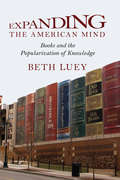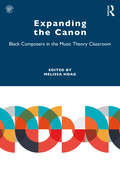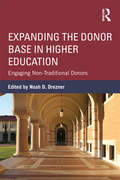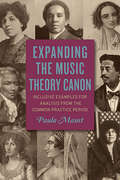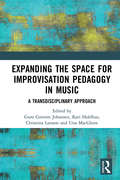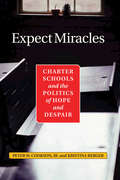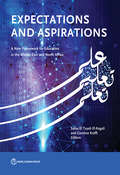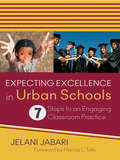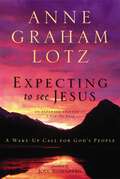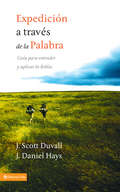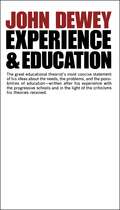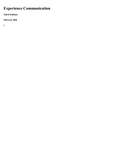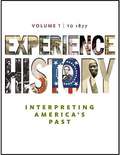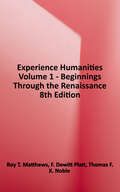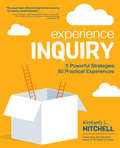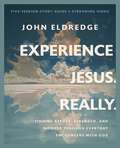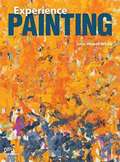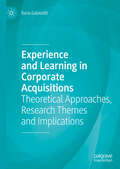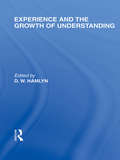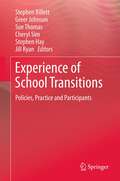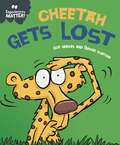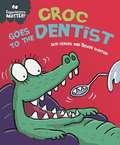- Table View
- List View
Expanding the American Mind: Books and the Popularization of Knowledge
by Beth LueyOver the past fifty years, knowledge of the natural world, history, and human behavior has expanded dramatically. What has been learned in the academy has become part of political discourse, sermons, and everyday conversation. The dominant medium for transferring knowledge from universities to the public is popularization--books of serious nonfiction that make complex ideas and information accessible to nonexperts. Such writers as Carl Sagan, Stephen Jay Gould, Stephen Hawking, Daniel Boorstin, and Robert Coles have attracted hundreds of thousands of readers. As fields such as biology, physics, history, and psychology have changed the ways we view ourselves and our place in the universe, popularization has played an essential role in helping us to understand our world. Expanding the American Mind begins by comparing fiction and nonfiction--their relative respectability in the eyes of reading experts and in the opinions of readers themselves. It then traces the roots of popularization from the Middle Ages to the present, examining changes in literacy, education, and university politics. Focusing on the period since World War II, it examines the ways that curricular reform has increased interest in popularization as well as the impact of specialization and professionalization among the faculty. It looks at the motivations of academic authors and the risks and rewards that come from writing for a popular audience. It also explains how experts write for nonexperts--the rhetorical devices they use and the voices in which they communicate. Beth Luey also looks at the readers of popularizations--their motivations for reading, the ways they evaluate nonfiction, and how they choose what to read. This is the first book to use surveys and online reader responses to study nonfiction reading. It also compares the experience of reading serious nonfiction with that of reading other genres. Using publishers' archives and editor-author correspondence, Luey goes on to examine what editors, designers, and marketers in this very competitive business do to create and sell popularizations to the largest audience possible. In a brief afterword she discusses popularization and the Web. The result is a highly readable and engaging survey of this distinctive genre of writing.
Expanding the Canon: Black Composers in the Music Theory Classroom
by Melissa HoagDirectly addressing the underrepresentation of Black composers in core music curricula, Expanding the Canon: Black Composers in the Music Theory Classroom aims to both demonstrate why diversification is badly needed and help faculty expand their teaching with practical, classroom-oriented lesson plans that focus on teaching music theory with music by Black composers. This collection of 21 chapters is loosely arranged to resemble a typical music theory curriculum, with topics progressing from basic to advanced and moving from fundamentals, diatonic harmony, and chromatic harmony to form, popular music, and music of the twentieth and twenty-first centuries. Some chapters focus on segments of the traditional music theory sequence, while others consider a single style or composer. Contributors address both methods to incorporate the music of Black composers into familiar topics, and ways to rethink and expand the purview of the music theory curriculum. A foreword by Philip Ewell and an introductory narrative by Teresa L. Reed describing her experiences as an African American student of music set the volume in wider context. Incorporating a wide range of examples by composers across classical, jazz, and popular genres, this book helps bring the rich and varied body of music by Black composers into the core of music theory pedagogy and offers a vital resource for all faculty teaching music theory and analysis.
Expanding the Donor Base in Higher Education: Engaging Non-Traditional Donors
by Noah D. DreznerWinner of the Association of Fundraising Professionals 2014 Skystone Partners Research Prize in Philanthropy and Fundraising Traditionally, institutions have relied on wealthy White men to reach their fundraising goals. But as state investment in public higher education lessens and institutions look to philanthropy to move from excellence to eminence, advancement officers continually need to engage all populations, including many that have historically been excluded from fundraising strategies. Based on theory, research, and past practice, Expanding the Donor Base in Higher Education explores how colleges and universities can build culturally sensitive fundraising and engagement strategies. This edited book presents emerging research on different communities that have not traditionally been approached for fundraising—including Lesbian, Gay, Bisexual, Transgender, and Queer (LGBTQ) alumni, African Americans, Latinos, graduate students, young alumni, women, and faculty donors. Chapters discuss and analyze successful programs and provide practical suggestions and strategies to create and implement fundraising programs that engage these new donor populations. Expanding the Donor Base in Higher Education is an essential resource for any institution looking to expand their pool of donors and cultivate a more philanthropic mindset among alumni and students.
Expanding the Music Theory Canon: Inclusive Examples for Analysis from the Common Practice Period
by Paula MaustFeaturing music by sixty-seven historical women and/or people of color, Expanding the Music Theory Canon is designed to supplement any introductory Western classical music theory curriculum. At a time when many academics are focused on increasing diversity and inclusion, this book provides the means to seamlessly incorporate works by underrepresented composers into music theory core courses. The anthology’s 255 musical examples are organized topically and include excerpts as well as nineteen complete pieces for analysis. Each chapter begins with guided analysis questions aimed at students approaching these concepts for the first time. Notably, this anthology provides a biography and image for each composer, which is particularly significant since works by these individuals have rarely been included in previous textbooks or anthologies. A related website, www.expandingthemusictheorycanon.com, provides additional examples and links to recordings when available. All musical examples in the anthology have been classroom-tested with music majors and minors at a major conservatory, at private and public universities, and at community colleges. Detailed tables provide suggestions for using this book in conjunction with the major introductory theory textbooks. A special set of online exercises has been prepared by the book's author using the Auralia & Musition software programs; you can find further information here: https://www.risingsoftware.com/expanding-the-music-theory-canon. Additional examples and a blog offering teaching suggestions may be found at: https://www.expandingthemusictheorycanon.com.
Expanding the Space for Improvisation Pedagogy in Music: A Transdisciplinary Approach
by Guro Gravem Johansen Kari Holdhus Christina Larsson Una MacGloneExpanding the Space for Improvisation Pedagogy in Music is a critical, research-based anthology exploring improvisation in music pedagogy. The book broadens the understanding of the potentials and possibilities for improvisation in a variety of music education contexts and stimulates the development of knowledge and reflection on improvisation. The book critically examines the challenges, cultural values, aims and methods involved in improvisation pedagogy. Written by international contributors representing a variety of musical genres and research methodologies, it takes a transdisciplinary approach and outlines a way ahead for improvisation pedagogy and research, by providing a space for the exchange of knowledge and critique. This book will be of great interest to scholars, researchers, and postgraduate students in the fields of arts education, music education, improvisation, music psychology, musicology, ethnomusicology, artistic research and community music. It will also appeal to music educators on all levels in the field of music education and music psychology.
Expect Miracles: Charter Schools And The Politics Of Hope And Despair
by Peter CooksonCharter schools are the most significant educational experiment in the last two decades. In Expect Miracles , Peter W. Cookson, Jr. and Kristina Berger focus on the current trend toward deregulation in public education. The issue of deregulation is of critical importance because the spirit of entrepreneurship that is behind deregulation is seldom examined from a sociological perspective. This book places the debate concerning the future of public education in a meaningful framework that allows the reader to ask new questions and seek genuine solutions. Using the latest research as the basis for discussion, this book provides a fresh look at the growing and politically volatile charter school movement. The authors present the most balanced analysis to date of the movement that is changing the landscape of American education.
Expectations and Aspirations: A New Framework for Education in the Middle East and North Africa
by Safaa El Tayeb El-Kogali Caroline KrafftEducation, which has been at the heart of the Middle East and North Africa (MENA) region’s history and civilizations for centuries, has a large untapped potential to contribute to human capital, well-being, and wealth. The region has invested heavily in education for decades, but it has not been able to reap the benefits of its investments. Despite a series of reforms, MENA has remained stuck in a low-learning, low-skills level. Expectations and Aspirations: A New Framework for Education in the Middle East and North Africa identifies four key sets of tensions that are holding back education in the region: credentials and skills, discipline and inquiry, control and autonomy, and tradition and modernity. These tensions are shaped by society and are reflected in classrooms. If they are not addressed, MENA will continue to operate at a level below its potential. This report outlines a new framework with a three-pronged approach that can help address these tensions and unleash the potential of education in MENA: • A concerted push for learning that starts early for all children regardless of background, with qualified and motivated educators, and that leverages technology, uses modern approaches, and monitors learning outcomes • A stronger pull for skills by all stakeholders in the labor market and society that involves coordinated multisystem reforms within and beyond the education system • A new pact for education at the national level with a unified vision, shared responsibilities, and accountabilities. Education is not just the responsibility of the education system—it is everyone’s business. The push, pull, and pact framework offers an opportunity for MENA to move forward to reclaim its heritage of a learned region and to meet the expectations and aspirations of its people. The current situation in MENA requires a renewed focus on education, not just as a national priority for economic growth and social development, but as a national emergency for stability, peace, and prosperity.
Expecting Excellence in Urban Schools: 7 Steps to an Engaging Classroom Practice
by Jelani JabariA seven-step plan for really engaging our urban students! One of the most immediate challenges in K–12 schools lies in implementing powerful pedagogy which emotionally, intellectually, and behaviorally engages students. This book supplies the missing threads through a framework for student engagement. You will explore a seven step process for emotionally, intellectually, and behaviorally engaging students with a wealth of strategies, techniques, and tools which create an engaging educational experience. Drawing on his more than twenty years in struggling classrooms, Jabari provides: Seven cohesive steps for planning, delivering, and reflecting on engaging learning experiences Techniques for forging deeper connections with students Strategies to transform students’ perceived “deficits” into instructional assets
Expecting to See Jesus: A Wake-Up Call for God's People
by Anne Graham LotzExpecting to See Jesus--the expanded edition of I Saw the Lord--is the result of Anne Graham Lotz's life lived in the hope of Jesus' return.As you journey with her through the pages of the Bible, you'll come to realize why she lives her life expecting to see Jesus at any minute. And, she wants to make sure you and all other Christians are ready for that moment when your faith becomes sight.Anne knows from personal experience that it's in the busyness of our days, as we're drifting in comfortable complacency, that we most need a wake-up call--a jolt that pushes us to seek out a revival of our passion for Jesus that began as a blazing fire but somehow has died down to an ineffective glow.In Expecting to See Jesus, Anne points out the biblical signs she sees in the world all around us and shows how you can experience an authentic, deeper, richer relationship with God in a life-changing, fire-blazing revival.
Expedición a través de la palabra: Guía para entender y aplicar la Biblia
by J. Daniel Hays J. Scott DuvallLa vida es un viaje, y como cualquier viaje, requiere de un mapa preciso y confiable para llevarnos a donde necesitamos ir. Dios nos ha provisto una guía así en su Palabra. Sin embargo, así como el navegante necesita aprender cómo interpretar todos los contornos y símbolos de un mapa, del mismo modo nosotros necesitamos poder entender cómo la Biblia nos comunica sus direcciones. Explorando la palabra de Dios ayuda a los que estudian la Biblia a adquirir las destrezas necesarias a fin de leerla, interpretarla y aplicarla con éxito a la vida. Este compendio del exitoso libro de texto de universidades y seminarios Grasping God’s Word [Captando la Palabra de Dios] toma los probados principios de ese libro y los hace accesibles a las personas de la iglesia. Empieza con algunos principios generales de interpretación, y luego pasa a aplicar esos principios a géneros y contextos específicos. Los ejercicios prácticos guían a los lectores durante el proceso de interpretación, con un énfasis en la aplicación a la vida real.
Expelling Public Schools: How Antiracist Politics Enable School Privatization in Newark
by John ArenaExploring the role of identitarian politics in the privatization of Newark&’s public school system In Expelling Public Schools, John Arena explores the more than two-decade struggle to privatize public schools in Newark, New Jersey—a conflict that is raging in cities across the country—from the vantage point of elites advancing the pro-privatization agenda and their grassroots challengers.Analyzing the unsuccessful effort of Cory Booker—Newark&’s leading pro-privatization activist and mayor—to generate popular support for the agenda, and Booker&’s rival and ultimate successor Ras Baraka&’s eventual galvanization of the charter movement, Arena argues that Baraka&’s black radical politics cloaked a revanchist agenda of privatization.Expelling Public Schools reveals the political rise of Booker and Baraka, their one-time rivalry and subsequent alliance, and what this particular case study illuminates about contemporary post–civil rights Black politics. Ultimately, Expelling Public Schools is a critique of Black urban regime politics and the way in which antiracist messaging obscures real class divisions, interests, and ideological diversity.
Experience And Education: 1938-1939, Experience And Education, Freedom And Culture, Theory Of Valuation, And Essays (Collected Works Of John Dewey Ser. #13)
by John DeweyExperience and Education is the best concise statement on education ever published by John Dewey, the man acknowledged to be the pre-eminent educational theorist of the twentieth century. Written more than two decades after Democracy and Education (Dewey's most comprehensive statement of his position in educational philosophy), this book demonstrates how Dewey reformulated his ideas as a result of his intervening experience with the progressive schools and in the light of the criticisms his theories had received. Analyzing both "traditional" and "progressive" education, Dr. Dewey here insists that neither the old nor the new education is adequate and that each is miseducative because neither of them applies the principles of a carefully developed philosophy of experience. Many pages of this volume illustrate Dr. Dewey's ideas for a philosophy of experience and its relation to education. He particularly urges that all teachers and educators looking for a new movement in education should think in terms of the deeped and larger issues of education rather than in terms of some divisive "ism" about education, even such an "ism" as "progressivism." His philosophy, here expressed in its most essential, most readable form, predicates an American educational system that respects all sources of experience, on that offers a true learning situation that is both historical and social, both orderly and dynamic.
Experience Communication
by Jeff ChildToday’s students are navigating a world in which most of their personal and professional interactions happen over mediated channels, whether through social media, web conferencing software, or distance learning tools. Experience Communication offers an accessible and relatable program built to address the skills students need to communicate effectively in the classroom, online, and in the workplace. <p><p> Experience Communication meets students where they are by foregrounding the core principles of effective communication and encouraging practical applications across scenarios relevant to their everyday lives.
Experience History To 1877
by Michael B. Stoff James West Davidson Brian Delay Christine Leigh Heyrman Mark H. LytleConnect students to the storiesof history. Connect students to the experienceof history. Connect students to success in history. At McGraw-Hill, we have spent the past few years deepening our understanding of the student and instructor experience. Employing a wide array of research tools including surveys, focus groups, and ethnographic studies, we've identified areas in need of improvement to provide an opportunity for greater learning and teaching experiences. Experience Historyis a direct result of this. Experience Historyis also a first in American History. Its groundbreaking adaptive diagnostic and interactive exercises paired with its lively narrative and engaging visuals creates a unique teaching and learning environment propelling greater student success and better course results. Instructors gain better insight into students' engagement and understanding as students develop a base of knowledge and construct critical thinking skills. Gripping stories keep students turning the page while the adaptive diagnostics for each chapter and a personalized study plan for each individual student help students prepare for class discussions and course work while enjoying increased course success. Experience History emphasizes that history is not just a collection of proven facts, but is "created" from the detective work of historians examining evidence from the past. Providing the interactive environment that only an integrated solution can provide,Experience History gives students the opportunity to examine primary sources and explore specific periods and events. This leads to greater understanding as well as the building and practicing of critical thinking skills. As students uniquely experience American History, Experience History propels students to greater understanding while achieving greater course success. Give students an experience. Improve course participation and performance. Experience History, and experience success.
Experience Humanities Volume 1 - Beginnings Through the Renaissance, 8th Edition
by Thomas F. X. Noble F. Dewitt Platt Roy T. MatthewsThe humanities are alive. We see the great pyramids in contemporary design, we hear Bach in hip-hop and pop music, and we feel ancient religious themes and philosophies in our impassioned contemporary dialogues. Experience Humanities invites students to take note of the continual evolution of ideas and cross-cultural influences to better understand the cultural heritage of the West, and to think critically about what their legacy will be for future generations. Together with Connect® Humanities, a groundbreaking digital learning solution, students not only experience their cultural heritage, but develop crucial critical reading, thinking, and writing skills that will prepare them to succeed in their humanities course and beyond.
Experience Inquiry: 5 Powerful Strategies, 50 Practical Experiences (Corwin Teaching Essentials)
by Kimberly L. MitchellOne part practical guide, one part interactive journal, this book provides the opportunity to do inquiry as you read about it. You’ll learn what inquiry-based instruction looks like in practice through five key strategies, all of which can be immediately implemented in any learning environment. This resource offers Practical examples of what inquiry looks like in the classroom, and how to do it Opportunities for reflection throughout the book, including self-surveys, templates, and tools A user-friendly handbook format for quick reference and logical progression through your inquiry journey Fifty practical inquiry experiences that can be used individually, with students, or in small groups of teachers
Experience Inquiry: 5 Powerful Strategies, 50 Practical Experiences (Corwin Teaching Essentials)
by Kimberly L. MitchellOne part practical guide, one part interactive journal, this book provides the opportunity to do inquiry as you read about it. You’ll learn what inquiry-based instruction looks like in practice through five key strategies, all of which can be immediately implemented in any learning environment. This resource offers Practical examples of what inquiry looks like in the classroom, and how to do it Opportunities for reflection throughout the book, including self-surveys, templates, and tools A user-friendly handbook format for quick reference and logical progression through your inquiry journey Fifty practical inquiry experiences that can be used individually, with students, or in small groups of teachers
Experience Jesus. Really Bible Study Guide plus Streaming Video: Finding Refuge, Strength, and Wonder through Everyday Encounters with God
by John EldredgeEmbark on a spiritual journey to cut through the murk of modern life and rediscover a deeply experiential relationship with Jesus Christ. Do you feel like you're living your day-to-day at a distance from the rich and nourishing intimacy with God that you long for?The Christian life is meant to be experiential. Our faith is meant to be felt. It should fill us with wonder. And yet we live in a world of weary, skeptical pragmatism. Our digital age has conditioned us to expect immediate answers and crippled our ability to entertain mystery and experience the healing power of Jesus.In this this five-session video Bible study (video access included), John Eldredge shows you how to develop deep, everyday habits—rooted in ancient Christian practices—that will help restore your faith and experience real intimacy with God.This study guide has everything you need for a full Bible study experience, including:The study guide itself—with discussion and personal reflection questions, video notes, and a leader's guide.An individual access code to stream all five video sessions online (DVD also available separately). Sessions and video run times:What Children and Mystics Know (22:30)The Refuge of God (20:30)Love and Truth as Refuge (19:00)Jesus: The Integrating Center of All Things (22:30)The Wonders of God&’s Kingdom (23:00) Streaming video access included. Access code subject to expiration after 12/31/2030. Code may be redeemed only by the recipient of this package. Code may not be transferred or sold separately from this package. Internet connection required. Void where prohibited, taxed, or restricted by law. Additional offer details inside.
Experience Printmaking
by Donna AndersonThis studio textbook program is a visually dynamic and extensive resource, specifically designed to fit a range of teaching styles, instructional needs, and classroom configurations. This curriculum covers all printmaking processes including: relief, intaglio, planography, and serigraphy. Students will have the opportunity to explore their own unique style and interests, through stimulating hands-on studio opportunities, from basic to advanced levels. Some of the features included in thistextbook to help make it the most valuable tool in the printmaking classroom are: * Key Terms - Important terms are highlighted and defined the first time they appear. Use these words to build your student's printmaking vocabulary. * In-depth Profiles - This feature highlights the historical and cultural influences that shape significant prints. * Step by Step How-To's - Diagrams and instructions that illustrate fundamental skills and techniques. * Student Artwork - Images included in each chapter encourage peer sharing and critique.
Experience and Learning in Corporate Acquisitions: Theoretical Approaches, Research Themes and Implications
by Ilaria GalavottiThis book analyses mergers and acquisitions within the broader framework of strategic decisions. Existing studies on corporate acquisitions have produced a variegated and inconclusive spectrum of findings on the strategic mechanisms that contribute to value creation. By building on the widespread recognition that firms substantially differ in their ability to carry out successful acquisitions, this book focuses on the diverse effects of experiential learning. A unique systematic literature review is provided, which thematically highlights the connections between various streams of research. The author aims to systematise our knowledge on experience and learning dynamics in corporate acquisitions, providing a detailed analysis of conceptual implications and presenting potential avenues for future exploration.
Experience and the growth of understanding (International Library of the Philosophy of Education Volume 11)
by D.W. HamlynThis volume examines some of the arguments that have been put forward over the years to explain the way in which understanding is acquired. The author looks firstly at the empricist thesis of genesis without structure, and secondly at the opposing theory, represented by Chomsky of structure without genesis. His greatest sympathy is with the theory of Piaget, who represents structure with genesis. He considers that Piaget's account is flawed, however, by its biological model and by its failure to deal adequately with the problem of objectivity. The second part of the book contains chapters on language, the differences between early and later learning, and on teaching. The book provides a general understanding of the principles that make it possible, and the differences between the ways in which they work at different stages.
Experience of School Transitions
by Sue Thomas Stephen Billett Cheryl Sim Greer Johnson Stephen Hay Jill RyanLeaving school, whether to move on to training, work or education, is a fundamental rite of passage the world over. This volume draws on a wealth of international sources and studies in its analysis of the 'transitions' young students make as they move on from their secondary schooling. It identifies how these transitions are planned for by policymakers, enacted by school staff and engaged with by students themselves. With data from a range of nations with advanced industrial economies, the book delineates how the policies relating to these transitions need to be conceived and implemented, how the transitions themselves are negotiated by young people, and how they might be shaped to meet the varied needs of the students they are designed to help. The authors argue that the relationship, often complex, between what schools provide in the way of preparation, and the ways in which students take up what is on offer, is the crucial nexus for understanding the experience of transitions by young people, and for enhancing that experience. With a host of case studies of transition policies themselves, as well as evaluative data on how they were received by the school leavers whom they were designed for, this valuable addition to the educational literature deserves to be read by all those with roles in preparing the young for their journey into a complex adult world full of pitfalls as well as opportunity.
Experiences Matter: Cheetah Gets Lost (Experiences Matter)
by Sue GravesCheetah Gets Lost offers a gentle introduction to the experience of getting lost for young children.This funny, charming story is the perfect way to introduce young children to the experience of getting lost. Also included are suggestions for activities and ideas to talk through together to help children reflect on their own experiences.When Cheetah gets lost on a day out with his friends and Uncle Hippo, he must try to keep calm and remember what to do to stay safe and find help.The Experiences Matter series of picture books provide a gentle means of discussing experiences, boosting self-esteem and reinforcing good behaviour. Supports the Personal, Social and Emotional Development Area of Learning in the Early Years Foundation Stage, and is also suitable for use with children in KS1 and can be used to discuss values. Suitable for children under 5.
Experiences Matter: Croc Goes to the Dentist (Experiences Matter)
by Sue GravesCroc Goes to the Dentist offers a gentle introduction to the experience of visiting the dentist for young children.This funny, charming story is the perfect way to introduce young children to the experience of visiting the dentist. Also included are suggestions for activities and ideas to talk through together to help children reflect on their own experiences.Crocodile loves sweet things, but when her teeth start to hurt, she needs to visit the dentist. Crocodile feels nervous, but the dentist is very kind.The Experiences Matter series of picture books provide a gentle means of discussing experiences, boosting self-esteem and reinforcing good behaviour. Supports the Personal, Social and Emotional Development Area of Learning in the Early Years Foundation Stage, and is also suitable for use with children in KS1 and can be used to discuss values. Suitable for children under 5.
